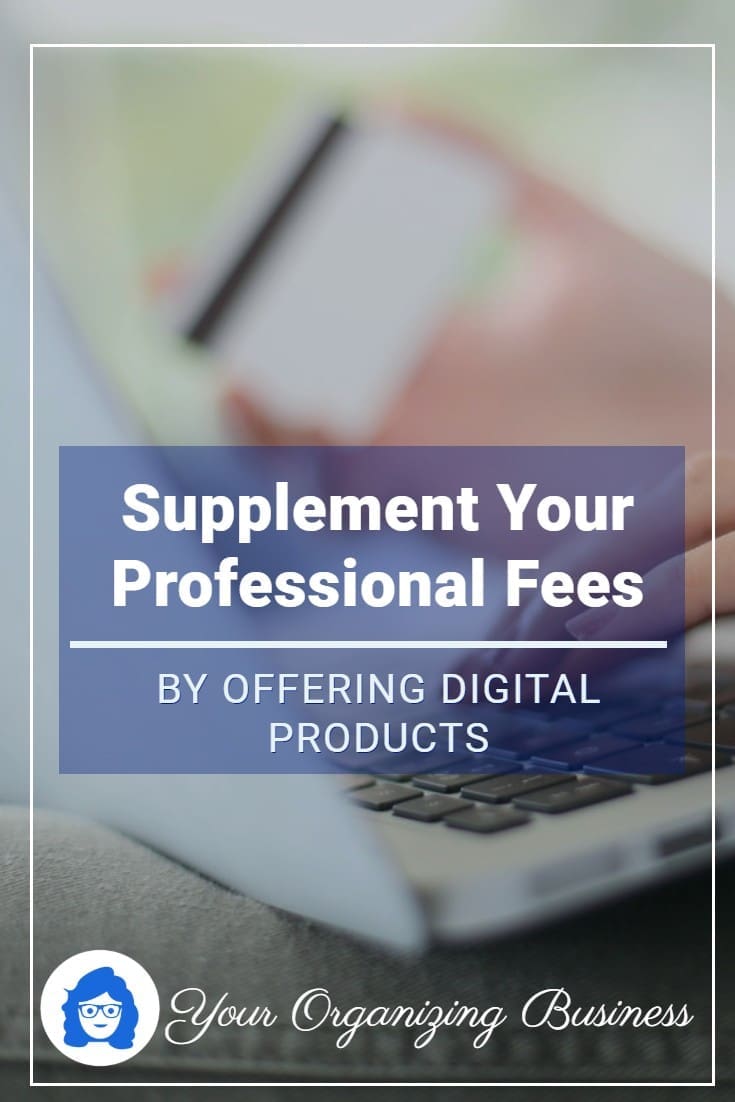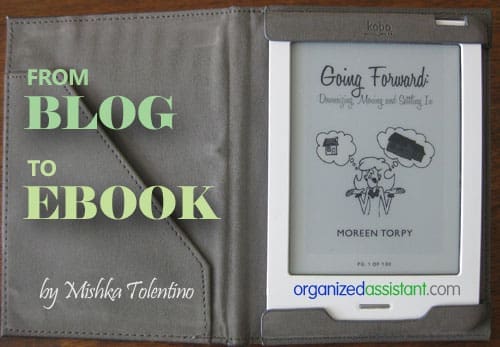Expand Your Income: Offer Digital Products Alongside Your Services
This page may contain links to Amazon.com or other sites from which I may receive commission on purchases you make after clicking on such links. Read my full Disclosure Policy

One of the downsides of running a service-based business is that your income is limited by the number of billable hours you can work. There are countless people who could benefit from your expertise but who may be unable to afford your services. To address the realities of today’s economy, you need to offer alternatives that cater to lower budgets.
One such option is to offer virtual organizing or coaching services. Another is to package your expertise into digital products.
E-books are a popular choice as they’re generally easiest to create and sell, but you can also offer audio or video recordings or even entire courses. Online courses typically carry higher prices than standalone e-books or recordings, but they can be harder to sell. They’re also more work to put together, both in terms of developing your material and setting them up. I covered this in more detail in Creating and selling online courses: what you need to know.
Create Digital Products from Scratch
To get your product on the market quickly, I suggest you look at material you’ve already created.
- Have you written blog posts or articles that could be compiled into an e-book?
- Have you delivered webinars that you could sell as recordings?
- If you’ve prepared a presentation, seminar, or workshop, could you to develop that material into an e-book or online course?
Create Digital Products with PLR Content
If you don’t have anything to repurpose and you’re not up to creating something from scratch, look into PLR (Private Label Rights) content, which is pre-written material you purchase the right to use. It’s usually inexpensive, and in most cases, you can tweak it to make it your own before packaging it as a product. Here are some examples from vendors whose materials I consider high quality:
- Boost Your Productivity with Bullet Journaling – articles
- Decluttering Your Home Office – course materials, action guide, checklist, social media posts, and more
- Digital Life Planner – Interactive PDF / Canva template
- Emergency Preparedness bundle – articles, social media posts, product recommendations and checklists
- Get Organized! Sorting Out the Clutter for a Streamlined Life bundle – articles, emails, social media posts, ebook compilation, challenge guide, ebook and workbook
- Grocery and Meal Planner – Canva template
- Minimalism – Less is More bundle – articles, emails, social media posts, ebook compilation, challenge guide, ebook and workbook
- Productivity + Time Management Planner – Canva / Word templates
- Productivity Essentials – course books, action guides, worksheets, and more
- Weekly Plan Sheet – Canva template
- Work-Life Balance Planner – Canva / PowerPoint templates
To learn more about using PLR to create your products, read Make Passive Income Reselling Digital Products with Private Label Rights (PLR) by Kayla Butler of Ivory Mix.
Ecommerce Solutions
Ecommerce has come a long way since it emerged in the mid-1990s. There are now countless tools and services to automate the sale of digital products so you don’t have to process orders manually. Here are just a few.
Shopping Cart Services
Some of the simplest solutions are standalone services where you create an account, upload your products, enter your prices and other details, and you’re good to go. In most cases, you can embed your online shop right on your regular website by adding some HTML code.
I’ve used the following systems on a number of websites.
E-junkie has been around since 2004 and is now more powerful and easier to use. It has a lot of great features, like shop-wide or product-specific promotions, discounts or gift cards; an affiliate program, so you can offer an incentive to others to promote your products; and customizable thank you emails and pages.
Plans range from $8.00 per month for 10 products to $40.00 per month for unlimited products.
Please note that if you want to display multiple products on your website, you’ll have to copy and paste HTML code for each one individually. You also have the option of creating a shop on their site and simply linking to it.
Ecwid (short for Ecommerce Widget) is even easier to use, as you only need to insert the code for your store and all of your products appear on your site, neatly organized into whatever categories you assign them to. If you have a WordPress website, you don’t even have to work with code – simply install a plugin, enter your store ID, and you’re done. And it’s just as easy to add the store to your Facebook page!
There are many other systems out there, some of which offer advanced features such as email marketing, client management, integration with other apps, and much more – but those capabilities carry a much higher price tag and may be more than you need right now.
eCommerce Plugins for WordPress
If you have a WordPress site, you might prefer to manage your online store from within your website dashboard, and there are plenty of plugins that will allow you to do just that.
Easy Digital Downloads is a plugin I’ve set up for several of my clients. The free version is all you need to get started, but there are premium extensions available for added features and functionality, such as:
- product reviews
- integration with Gravity Forms, Mailchimp or other third party apps
- purchase rewards
WP eStore is another WordPress eCommerce plugin that’s worth looking at. It’s not free, but it’s fairly inexpensive and doesn’t require yearly renewal like most premium plugins. I haven’t used it but have used other plugins from the developer, Tips and Tricks HQ, and am pleased with the level of support they provide.
WooCommerce is probably the most popular eCommerce plugin for WordPress sites. It’s developed and supported by Automattic, the company behind WordPress. The basic plugin is free, and there are hundreds of free and premium extensions available for enhanced functionality. This makes it very powerful, but it can be tricky to work with if you’re not tech savvy.
Offering Affiliate Products
Even if you’re not ready to develop your own products, you can earn commission by promoting other people’s. Whenever you find a product you like and you think would benefit your clients, blog readers, or website visitors, check to see if they offer an affiliate program. You’re probably going to recommend it anyway, so why not earn some extra income for your time and effort?
To learn more, read How to Choose Money-Making Affiliate Programs.
Do you already sell products through your website? What type of technology do you use? What do you like most/least about it?
Photo Goodluz / Depositphotos





This is very tangible and practical advice. Thank you, Janet! One caution to everyone is to remember that the tax implications for an ecommerce product may be different than those for on-sight services, so make sure you are collecting the correct sales tax. It’s always good to keep your eyes open for alternative income streams, though, so this is quite timely!
That’s a very good point, Seana. I didn’t go into any detail about that side of it, but it’s very important to know what tax you should be charging and to ensure that whatever system you use calculates it automatically. For example, in Canada, tax varies from province to province and we have to charge based on the location of the purchaser, so that all has to be set up from the beginning.
Awesome info, I do sell a product called “Our Map” it is for passwords and important information to leave with your family/Financial Advisor, etc but I would love to learn how to publish an e-book! Thanks!
Lisa
That sounds like a very useful product, Lisa.
You might find this post helpful as well: Turn your blog into an e-book: The Easy Step-by-Step Guide to Turning Your Blog Entries into Money
I love these ideas, Janet.
Thanks, Diana! Are you thinking of developing a digital product, or do you already offer them?
Thank you for all this practical information Janet, I’m very grateful to have it all in one place to go through. The learning curve on this brave new digital world just keeps climbing, so having you break it down like this is a lifeline.
That is so nice to hear. To be honest, this started out as two old posts that were so outdated I’d taken them offline, but with what’s going on right now, it seemed like a good time to update them and flesh them out. I’m glad it’s helpful.
Thanks for sharing, Janet! This post is beneficial. It’s essential to do your research before using these Plugins. Asking your support team will give you some guidance. If you are in the U.S., remember that some digital products are taxable in the various U.S. States. This means you will need to collect the tax and then pay the state. Contact your accountant/lawyer for more specific details about your situation.
Seana mentioned something similar. Next time I update this post, I’ll be sure to mention taxes.
All great ideas, Janet! I remember pulling together some freebies when I set up my e-newsletter, but it’s been a while since I thoughts about offering sellable downloads. I certainly have a lot of content that I could use, so it might be time to start considering this as another revenue stream. Thank you for the inspiration and advice.
You definitely have a lot of content, and along with your experience from writing your book, The Other Side of Organized, you are well-equipped!
It’s great to revisit this post. It’s just as enticing now as it was when I first read it. I spend a reasonable amount of time thinking about how to repurpose some of my material. I’ve done this through my virtual workshops in the last few years. I developed content for the workshops by compiling ideas from my written posts and then expanding on those.
There are other excellent ideas here to consider again, too. Thank you for bringing this forward.
That was an excellent idea! It’s much more practical to build on work you’ve already done than to start from scratch every time you do somehting new.
This is very timely. Thanks. I just started a project using old blog posts and will use this post as reference. I have never set up e-commerce, so I’ll need your help.
I look forward to it!
These are such great ideas! I’ve seen quite a few on websites and on Instagram. I wonder how well they do and why some do better than others. I love the options.
You definitely need a good marketing strategy, and the price point needs to be right too. If it’s too costly, people might not see the value in it, but if it’s too cheap, they might figure it’s not very good.
I’ve been looking for a push to leave Payloadz, which went from taking a small cut to taking a larger cut and having a hefty monthly fee. In all these years, I’ve only put effort into selling three of my ebooks, but I’ve got so much content, it would be easy to ramp up an empire. (I wish I’d read this kick-in-the-butt post two months ago, when the whole pandemic started!)So now, it’s a matter of choosing between something like the plugin for Ecwid or really-and-truly going for a full-on e-commerce plugin. You’ve given me so much to think about! Ack! 😉
And how did I not know that Hazel had an affiliate program?
At least now you know what your options are!
You’ll have to ask Hazel about that. 😀
Heh, and it’s been four years and I’m still using Payloadz.
I realize that I bristle at spending money on a new solution since I’m underusing the paid solution I already have; I spend far too little time promoting my ebooks (vs. my professional services). The truth is, I’ve written so much material that I could probably create an entire empire of ebooks if I put my mind to it, and that would make it worth the effort of using something like Ecwid or WooCommerce. Hopefully it won’t be another four years before I take some real action on this concept.
I’m still not sure how I feel about PLR content; it feels like cheating. I wouldn’t use it, just because my writing style is so closely tied to my personality (and I think a professional’s digital products serve to reflect their professional skills, so someone else’s writing may create a false expectation of the individual’s service style and skills). It’s basically like hiring a ghostwriter, no? Hmmm.
It’s a lot of work to transition from one system to another, but if you’re paying a monthly fee, it might be worth it to switch to something like Easy Digital Downloads, which is free if you don’t need any of the add-ons.
I don’t consider PLR cheating. I often use it as an outline for my writing, but I generally edit it like crazy to make it my own. It still saves me time and brainpower, though making poor quality PLR usable is worse than starting from scratch.
I liked the idea of using PLR’s. I have some downloaded to my computer that I use in my FB group. I never thought of expanding them and making them a product to sell. Thanks for the idea. I would be thoughtful about creating your own product as the market seems to be flooded with free items and it can be difficult to get people to pay. Use your time wisely is what I am suggesting.
You raise some valid concerns! You can spend a lot of time and energy creating an ebook, only to find someone else is offering a similar item for free. That’s why you need to make sure what you’re offering is unique, even if you use PLR. Make it so good that people will want to buy it! (Easier said than done, I know…)